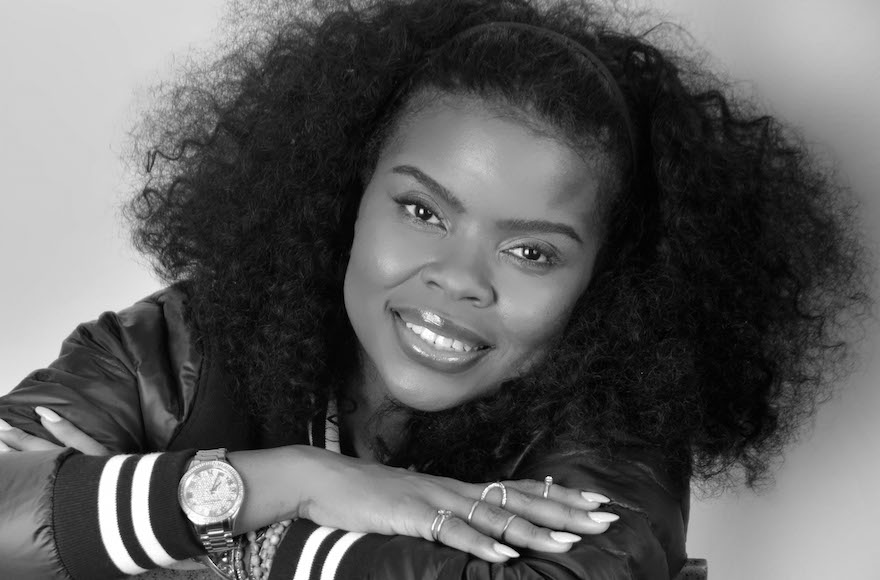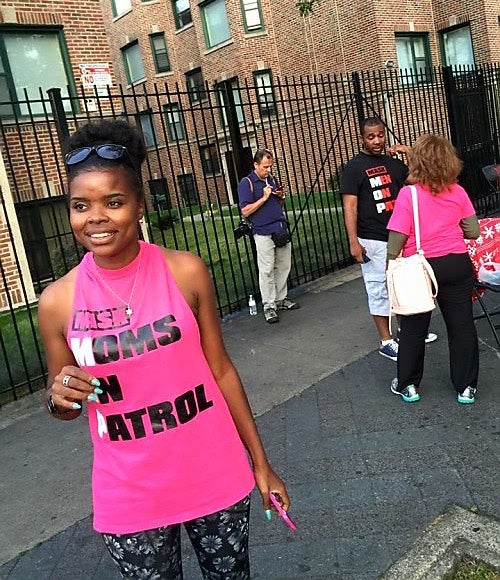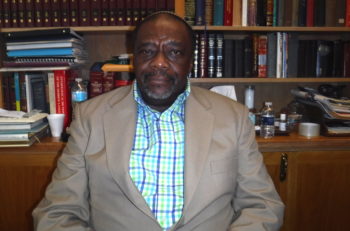Black rabbinical student leads ‘Army of Moms’ in fighting Chicago gun violence
Published October 21, 2016

Tamar Manasseh: “I was always taught that Jews were survivors. … Black people were never taught that we were survivors.” (Courtesy of Manasseh)
CHICAGO (JTA) — The same week Tamar Manasseh’s African-American son was going to become a bar mitzvah, gang violence killed two 13-year-old black boys who were also from Chicago’s South Side.
ADVERTISEMENT
As she picked out the bar mitzvah suit for her son, Manasseh couldn’t shake the image of the slain boys’ mothers, who were likely also picking out suits — for their sons to be buried in.
Manasseh, a lifelong Chicagoan who attended Jewish day school and is now studying to be a rabbi, has always been proud to be Jewish and black. But gun violence, which has surrounded the 38-year-old since she was a kid, has accentuated both the tensions and connections between the two parts of her identity. While most South Side Jews lived in the relatively affluent neighborhood of Hyde Park, she grew up in nearby Englewood, an area that she described as “Afghanistan.”
“I was always taught that Jews were survivors,” Manasseh told JTA. “The Holocaust happened, and Jews survived that, right? Black people were never taught that we were survivors. If anything, we’re pretty much taught that we were born to die. Being Jewish, I was never able to look at things like that.”
Manasseh — a mother of two children, ages 18 and 20 — has taken it upon herself to stop gun violence in Englewood. During the summer months, when programs to keep kids off the streets are scarce, she and several other parents — who she dubs an “Army of Moms” — spend hours sitting on the corner of 75th Street and South Stewart Avenue chatting to passers-by and offering them barbecue.
ADVERTISEMENT
The food and talk, she said, has been enough to stop gun violence there. And the statistics back her up: The corner, in the middle of a violent neighborhood, has seen zero shootings this year.
“I felt like if I didn’t do something, it would come for my kids eventually,” said Manasseh, who sells real estate and studies for her ordination in her spare time. “So I’m more afraid of what happens if I don’t get out there and do something than I am if I do. I’m more afraid of one of my kids being shot than I am of me being shot.”

Tamar Manasseh, on the corner of 75th Street and Stewart Avenue on Chicago’s South Side, gathers mothers at the intersection to prevent violence there. (Courtesy of Manasseh)
Chicago has become a hotbed of gun violence in recent years — especially on the South Side. Nearly 6,000 people have been shot since the beginning of 2015, and Chicago experienced 78 homicides in August alone, making it the deadliest month the city has seen in nearly two decades. Some residents have nicknamed the city “Chi-raq,” a portmanteau of Chicago and Iraq, because it can feel like a war zone.
Manasseh, however, has found some success in curbing the violence, and she’s looking to build upon it. She founded a nonprofit, Mothers Against Senseless Killings, which has raised approximately $20,000 to fund the street corner presence and support cash-strapped young men who might otherwise turn to crime.
Following a dispute with the landlord of the building next to their usual spot, the group, known as MASK, is raising more money to buy the vacant lot across the street, where they can set up a permanent play area for kids. MASK has spawned offshoots in Staten Island, New York, and Evansville, Indiana.
“When your parents are home watching every move you make, would you and your siblings set the house on fire? Probably not,” she said. “All it took was people being there. Some of these kids, they’ve never had anybody there looking out for them.”
Manasseh grew up attending Beth Shalom B’nai Zaken Ethiopian Hebrew Congregation, an African-American Hebrew Israelite congregation on the South Side, as well as Akiba-Schechter, a local Jewish day school that was affiliated with the Conservative movement at the time. Before Manasseh was born, her mother had “reverted,” in Manasseh’s words, to Judaism.
Although she was born and raised Jewish, at age 30 Manasseh decided to undergo a confirmation of her Judaism, which involved immersion in a ritual bath, supervised by Rabbi Capers Funnye, who leads Beth Shalom B’nai Zaken. Her children underwent similar processes at the time of their bat and bar mitzvahs.
Last year, Funnye was appointed head of the International Israelite Board of Rabbis, an African Hebrew Israelite body. Although the Hebrew Israelite movement is usually considered outside the mainstream by Judaism’s main denominations, Funnye has undergone a conversion by Conservative rabbis and is a member of the Chicago Board of Rabbis.
Manasseh is pursuing her rabbinic ordination at the Israelite Academy, the Hebrew Israelite rabbinical school, where she’s been studying part-time for seven years. Should she graduate next year, she will be the first woman to receive ordination from the academy. But though she was raised in the movement and is set to hold its rabbinic degree, she does not identify as a Hebrew Israelite. She identifies as a Jew — full stop.
“If you have to look a certain way to be a Jew, that’s a bad thing,” she said. “I think if you have to look a certain way to be a Hebrew Israelite, that’s a bad thing. So no, I’m just a Jew, I’m just Jewish. Because even the Hebrew Israelite movement is born out of the black nationalist movement, and it has something to do with race. And you cannot have race and religion occupying the same space.”
MASK isn’t explicitly Jewish, but it is infused with Jewish themes and language. One of the group’s projects, which has planted 10 Crimson King maple trees around Chicago in memory of gun victims, is inspired by the Jewish arboreal holiday of Tu b’Shvat, she said. The trees’ leaves are red to symbolize the blood of the victims.
Last week, the group held a concluding service for Yom Kippur that along with traditional elements like the Amidah prayer and shofar blowing featured volunteers reading out names of shooting victims.
Manasseh isn’t the only Jewish activist working to fight gun violence. Last year, the Jewish Council on Urban Affairs, a Chicago social justice group, joined a campaign to persuade the University of Chicago to build a trauma center on its medical campus to better serve shooting victims. The university broke ground on the center last month.
“One of the ways we could add value was we had access to people in positions of power,” said Judy Levey, JCUA’s executive director. “We’re not there to target the Jews by any stretch, but in some campaigns, there are Jews in positions of leadership, and that helps.”
In addition, Funnye is part of a coalition of faith leaders that helps combat gun violence by engaging with young men on the streets through local activist groups. While few black men on the South Side are Jewish, Funnye — who incidentally is a cousin of Michelle Obama — said his religion doesn’t get in the way of connecting with them.
“Before they see me being a Jew, they see me as being a black man, and they see me as being a black man that’s interested in them, and then they see that I’m a rabbi,” Funnye said. “This is an individual they can interface with.”

Rabbi Capers Funnye is part of a coalition of Chicago faith leaders that helps combat gun violence by engaging with young men on the streets. (Ben Sales)
Funnye remembers Manasseh composing Jewish songs as a 14-year-old in his congregation, and isn’t surprised that she has applied her Jewish learning to community organizing.
“Her pulpit is on the corner,” Funnye said. “She is practicing her rabbinate. I think that she is sincere, and I think the people she approaches on the block feel the depths of her sincerity.”
While more than two dozen Chicago Jewish clergy pledged to support the trauma center campaign, and some have spoken out against gun violence or attended events, Manasseh wants to see more of them on the street with her.
Last week, she met with JTA at a chic Hyde Park cafe surrounded by greenery, upscale shops and University of Chicago buildings. It’s just four miles from her intersection, but psychologically a world away. It felt like an incongruous place to talk about gun violence in a poor neighborhood.
But if Manasseh also felt the conversation was out of context, she wasn’t bothered by it. She wore a Chicago Cubs hat and sweatshirt — risky apparel on the South Side, which is White Sox country — and exuded confidence and focus. After a lifetime of sticking out — first by virtue of being a black Jewish woman, and then by becoming the first woman to try for ordination in her movement — she feels other Jews could benefit by leaving their comfort zone.
“It’s all smoke and mirrors,” she said, referring to some Jewish efforts against gun violence. “There are many Jewish social justice organizations that are able to do as much as they can to make themselves look good, but nothing that will have impact in the long run. I want to see them be the Jews they claim they are.”














